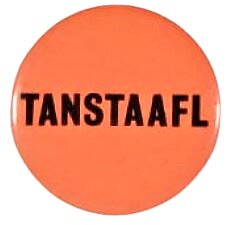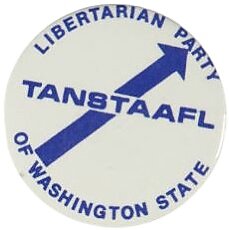In the early, scruffy days of the modern libertarian movement, the late 1960s and early 1970s, a popular libertarian slogan was TANSTAAFL — “There ain’t no such thing as a free lunch.” See the buttons at the right. It meant that government can’t hand out free stuff indefinitely — benefits have to be paid for. Or more generally, to economists, it refers to opportunity costs. But who said it first?
In my recent study of the citations in Bartlett’s Familiar Quotations, I saw that the editors listed the slightly more grammatical version, “There’s no such thing as a free lunch,” as “attributed” to Milton Friedman. They could have cited his 1975 book by that title. And Friedman did make the point frequently. As did Johan Norberg in this discussion of Friedman and the “no free lunch” idea.
But Friedman wasn’t first. Science fiction author Robert A. Heinlein had popularized the phrase and the abbreviation in his 1966 Hugo Award-winning novel The Moon Is a Harsh Mistress. He even posited a new country with TANSTAAFL on its flag. That’s likely where early libertarians came across it. Including a young economist named Edwin Dolan, who published a book in 1971 titled TANSTAAFL: A Libertarian Perspective on Environmental Policy. So was Heinlein the first?
The website Quote Investigator dug deeper, and found a 1938 newspaper article titled “Economics in Eight Words.” It was a fable of a king who demanded that his economic advisers give him a “short and simple text” on economics. As they presented him with massive tomes, he repeatedly executed some and demanded that the others come back with the short text he had asked for. Finally there was just one elderly economist left, who said to the king,
“Sire, in eight words I will reveal to you all the wisdom that I have distilled through all these years from all the writings of all the economists who once practiced their science in your kingdom. Here is my text:
“There ain’t no such thing as free lunch.”
That seems to be the first time the phrase was used specifically as an economic principle. The fable was unsigned, but Quote Investigator found evidence that it was likely written by Walter Morrow, editor-in-chief of The Southwestern Group of Scripps-Howard Newspapers. And now, perhaps for the first time, the 1938 article is published online at Libertarianism.org.
I’d say that Heinlein’s book generated the buttons and bumper stickers produced by the early libertarian activists. Friedman’s repeated use of the term and the concept brought it to a wider educated audience. But Heinlein just might have read one of the 1938 newspapers in which the “Eight Words” article appeared.


